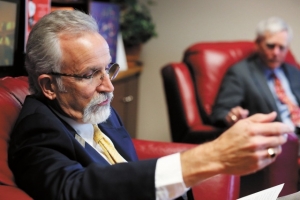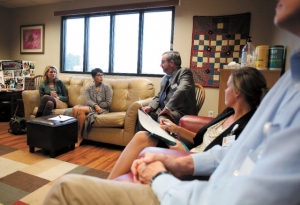First lady visits county, talks proposed literacy program
By Steve Herring
Published in News on November 3, 2017 5:50 AM

News-Argus/CASEY MOZINGO
Steve Parr, executive director of the United Way, speaks during a meeting Thursday at Goldsboro Pediatrics to discuss literacy in Wayne County with N.C. First Lady Kristin Cooper.

News-Argus/CASEY MOZINGO
Executive Director for The Partnership for Children of Wayne County Charles Ivey, center, talks about some of the things his organization is doing to help with the literacy rate.

News-Argus/CASEY MOZINGO
Dr. David Tayloe speaks during a meeting Thursday at Goldsboro Pediatrics to discuss literacy in Wayne County with N.C. first lady Kristin Cooper.

News-Argus/CASEY MOZINGO
First lady Kristin Cooper gives feedback on what several Wayne County organizations are doing to promote literacy in the area during her visit Thursday.
North Carolina first lady Kristin Cooper was briefed on a proposed literacy pilot program in Wayne County Thursday afternoon.
Cooper started her trip with lunch in Kinston before visiting Goldsboro Pediatrics to talk with Dr. Dave Tayloe and Wayne United Way Executive Director Steve Parr about efforts to improve literacy in Wayne County.
United Way has received an anonymous local gift of a little under $600,000, Parr said.
People tend to think of United Way supporting traditional projects, so discussions with the donor included nontraditional projects, Parr said.
The discussion included current issues such as reading proficiency, Parr said.
That included looking at statistics, which led Wayne United Way to consider the possibility of a project that would have impact down the road in working with pre-K students, he said.
Tayloe, who is known for his support of literacy programs, is on the committee, Parr said.
"Our vision is to have a five-year pilot project that we can create what (Wayne County Library Director) Donna Phillips termed a 'learning community' with a small group of students," Parr said. "We are talking pre-K, two and three to track them in their progress for the next four or five years."
The need for an educated populace impacts the future of business, military, law enforcement -- all which have a vested interest in the issue, he said.
"We have them sitting at the table to do the input," Parr said. "So it is looking that much further down the road."
Parr said he recently had a conversation with a local manufacturer who said he had jobs he needed to fill. The man asked where was he going to find people to fill those jobs down the road.
"We feel this is a great opportunity," Parr said. "We don't like to duplicate so our committee decided we are going to enhance the Read Wayne program and build upon it. We are extremely excited about it. We have a few more months of work."
Parr invited Cooper back in February when the group hopes to launch the program to the community.
Along with improving access to books, the pieces to the project include an adult literacy component, Parr said.
More details about the project will be announced at a later date, he said.
"There are countries in the world that don't have illiteracy so there is no reason we could not aspire to be one of them," Cooper said.
Being unable to read is linked to poverty, she said.
"You can spend a little early or you can spend a lot later on," Cooper said. "The most cost effective is to get in there early. It is trying to make people understand that maybe your greatest economic development thing that you can do is to invest in that sort of thing."
Cooper said that when an industry asks her husband about North Carolina, the first question isn't about taxes -- it is about an educated workforce.
"If you don't have that in place, they will just go somewhere else," she said.
Cooper said she was familiar with the Reach Out and Read program having talked previously with Tayloe during a symposium in Charlotte.
"So it is sort of something that we have been learning about as we have gone along," she said.
Cooper said she would take the information back to her husband, who is already sold on literacy.
"This is something that interests him a lot, early intervention and early childhood education and getting kids prepped to be successful in life," she said. "That is something that makes sense to both of us. We want to invest in the people of North Carolina. That is our greatest natural resource."
There is a great tradition in the state of education being a way out of poverty for a lot of people, she said.
"We want to see that continue," Cooper said. "We certainly would like to see more money budgeted for early childhood education, public education, substance abuse and mental health issues. We think that would be a wise way to spend money.
"I think that the governor's budget did that, but there is a ways to go with that. Certainly I will share what they did today. Having grown up in this part of the state, pretty much down the road, I think he understands how things work down here."
Ilina Ewen, Cooper's chief of staff, added that a lot of the things Cooper talks about aren't really partisan issues, and should not be.
"We are talking about the well-being of children and families in our state," she said. "There are ways to collaborate, lots of great minds from across the aisle to make all of these ideas come to fruition. I think these are all things to celebrate."
It benefits everybody when there have an educated, well-fed populace, Cooper said.
"That is how you fuel your economy. That is really important east of I-95," she said.
